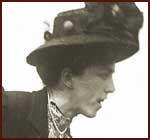
| Introduction |
| The Inheritance |
| Reform to 1850 |
| 1850-1900 |
| Twentieth Century |
| Entire Collection |
| Search the Collection |
| Radical Songs |
| Further Reading |
| Acknowledgements |
| Home |
The Voice of Radicalism
Economic and Social Radicalism - Twentieth Century
Although radicals could agree about political equality they could not agree about economic and social equality. As the electorate expanded, the clash of class interests became more important and the radicals disagreed even more.
Middle Class Radicalism
This emphasised the importance of economic freedom for the individual. Middle class radicals believed that an individual should have the freedom to earn as much as he wanted and to use these earnings in any way he wished. The political struggle had been intended to:
- Free the individual from restrictions. These restrictions were meant to keep everyone in their place so that they could compete on equal terms in the market place
- Open careers in public service on the basis of ability, rather than through connections to someone of importance
- Remove artificial restrictions, such as taxes, on business. Trade Union bargaining was also seen to be a restriction.
Middle Class radicals believed that the right to acquire and retain private property was a natural right. Inequality was an acceptable, if not desirable
consequence of economic and political freedom.
Working Class Radicalism
This emphasised the importance of economic equality for the collective (group). Socialists believed that gaining the right to vote for all was wrong if the conditions of the working class did not improve as a result. They wanted:
- A welfare state, to be based on taxation of the middle and upper classes, who could afford this taxation
- Major industries to come under public ownership
- A ‘New Social Order’, or equal society, as promised by the Labour Party manifesto in 1918.
The Socialist focus on class rather than on the individual, and a rejection of capitalism, was a clear break with Liberal radicalism.
Twentieth Century >>
